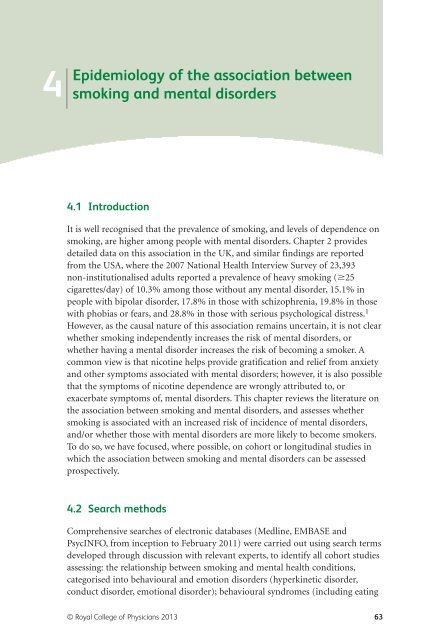Smoking and mental health - NCSCT
Smoking and mental health - NCSCT
Smoking and mental health - NCSCT
Create successful ePaper yourself
Turn your PDF publications into a flip-book with our unique Google optimized e-Paper software.
Epidemiology of the association between<br />
4 smoking <strong>and</strong> <strong>mental</strong> disorders<br />
4.1 Introduction<br />
It is well recognised that the prevalence of smoking, <strong>and</strong> levels of dependence on<br />
smoking, are higher among people with <strong>mental</strong> disorders. Chapter 2 provides<br />
detailed data on this association in the UK, <strong>and</strong> similar findings are reported<br />
from the USA, where the 2007 National Health Interview Survey of 23,393<br />
non-institutionalised adults reported a prevalence of heavy smoking (25<br />
cigarettes/day) of 10.3% among those without any <strong>mental</strong> disorder, 15.1% in<br />
people with bipolar disorder, 17.8% in those with schizophrenia, 19.8% in those<br />
with phobias or fears, <strong>and</strong> 28.8% in those with serious psychological distress. 1<br />
However, as the causal nature of this association remains uncertain, it is not clear<br />
whether smoking independently increases the risk of <strong>mental</strong> disorders, or<br />
whether having a <strong>mental</strong> disorder increases the risk of becoming a smoker. A<br />
common view is that nicotine helps provide gratification <strong>and</strong> relief from anxiety<br />
<strong>and</strong> other symptoms associated with <strong>mental</strong> disorders; however, it is also possible<br />
that the symptoms of nicotine dependence are wrongly attributed to, or<br />
exacerbate symptoms of, <strong>mental</strong> disorders. This chapter reviews the literature on<br />
the association between smoking <strong>and</strong> <strong>mental</strong> disorders, <strong>and</strong> assesses whether<br />
smoking is associated with an increased risk of incidence of <strong>mental</strong> disorders,<br />
<strong>and</strong>/or whether those with <strong>mental</strong> disorders are more likely to become smokers.<br />
To do so, we have focused, where possible, on cohort or longitudinal studies in<br />
which the association between smoking <strong>and</strong> <strong>mental</strong> disorders can be assessed<br />
prospectively.<br />
4.2 Search methods<br />
Comprehensive searches of electronic databases (Medline, EMBASE <strong>and</strong><br />
PsycINFO, from inception to February 2011) were carried out using search terms<br />
developed through discussion with relevant experts, to identify all cohort studies<br />
assessing: the relationship between smoking <strong>and</strong> <strong>mental</strong> <strong>health</strong> conditions,<br />
categorised into behavioural <strong>and</strong> emotion disorders (hyperkinetic disorder,<br />
conduct disorder, emotional disorder); behavioural syndromes (including eating<br />
© Royal College of Physicians 2013 63














